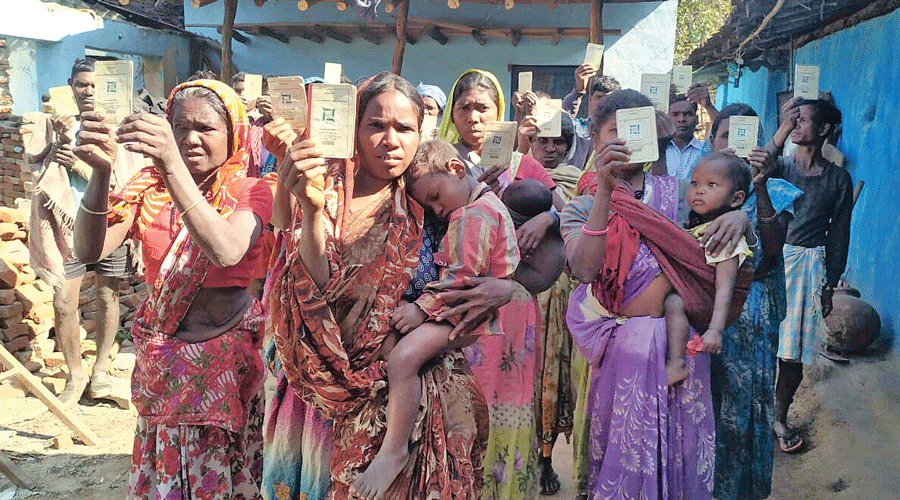The National Human Rights Commission (NHRC) has summoned the Jharkhand chief secretary and the Garhwa district magistrate-cum-deputy commissioner to personally appear before it on June 29 over the failure to submit reports relating to tribals starving because of lack of rations.
The NHRC order on Tuesday, which followed the hearing of a complaint lodged by the New Delhi-based tribal rights organisation Indigenous Rights Advocacy Centre (IRAC), takes note of the non-submission of reports relating to the starvation of about 8,000 tribals in Garhwa district despite reminders to the authorities concerned.
The NHRC has asked Jharkhand chief secretary Sukhdeo Singh and Garhwa district magistrate Ramesh Gholap to appear physically before the commission in New Delhi along with the documents and information sought.
However, if these are received on or before June 22, the two officers will be exempted from personal appearance, the NHRC said.
Dilip Chakma, executive director of the IRAC who had lodged the complaint in October last year on the basis of media reports, welcomed the decision of the NHRC.
“In October 2021, it was reported in the media that some 8,000 tribals, including Particularly Vulnerable Tribal Groups (PVTGs) families, were starving due to denial of ration in Garhwa district for the last three months and some of them were surviving by eating edible wild roots.
“On behalf of these starving tribals, the IRAC filed a complaint before the National Human Rights Commission, which registered a case and issued notices to the chief secretary, government of Jharkhand, and the district magistrate, Garhwa, calling for a report within six weeks,” Chakma said.
“The first notices were issued on November 16, 2021, and the final reminder was issued on March 8, 2022, but both the chief secretary and the district magistrate ignored the notices and did not submit the reports to the NHRC. The non-compliance of the orders of the National Human Rights Commission is a serious matter. The culture of impunity is the greatest enemy of the enjoyment of human rights. We welcome the strict action taken by the NHRC,” he added.
They have received ration now but no compensation.
The NHRC has the power of a civil court while enquiring into complaints and can summon any official and require any person to furnish information under Section 13 of the Protection of Human Rights Act, 1993.
The IRAC had alleged in its complaint to the NHRC quoting reports published in local vernaculars that “PVTGs were starving due to inaction by the authorities to provide ration under the Public Distribution System (PDS) as well as under a free rice scheme for Primitive Tribal Groups (PTG) known as the PTG Dakia Yojana in Jharkhand”.
The complaint further said that 8,000 beneficiaries belonging to PVTGs had not received free ration in 15 blocks, including Ranka in Garhwa. It quoted a Hindi news channel report that tribal families under the Siroi Kalan panchayat in Ranka block had not received ration for three months before Dussehra 2021 and as a result were starving and surviving on roots available in the forest.
The complainant had sought the NHRC’s intervention for a high-level inquiry into the denial of ration along with immediate provision of ration and to hold officers accountable for the lapse.
Repeated calls to chief secretary Singh and deputy commissioner Gholap did not evince any response.










